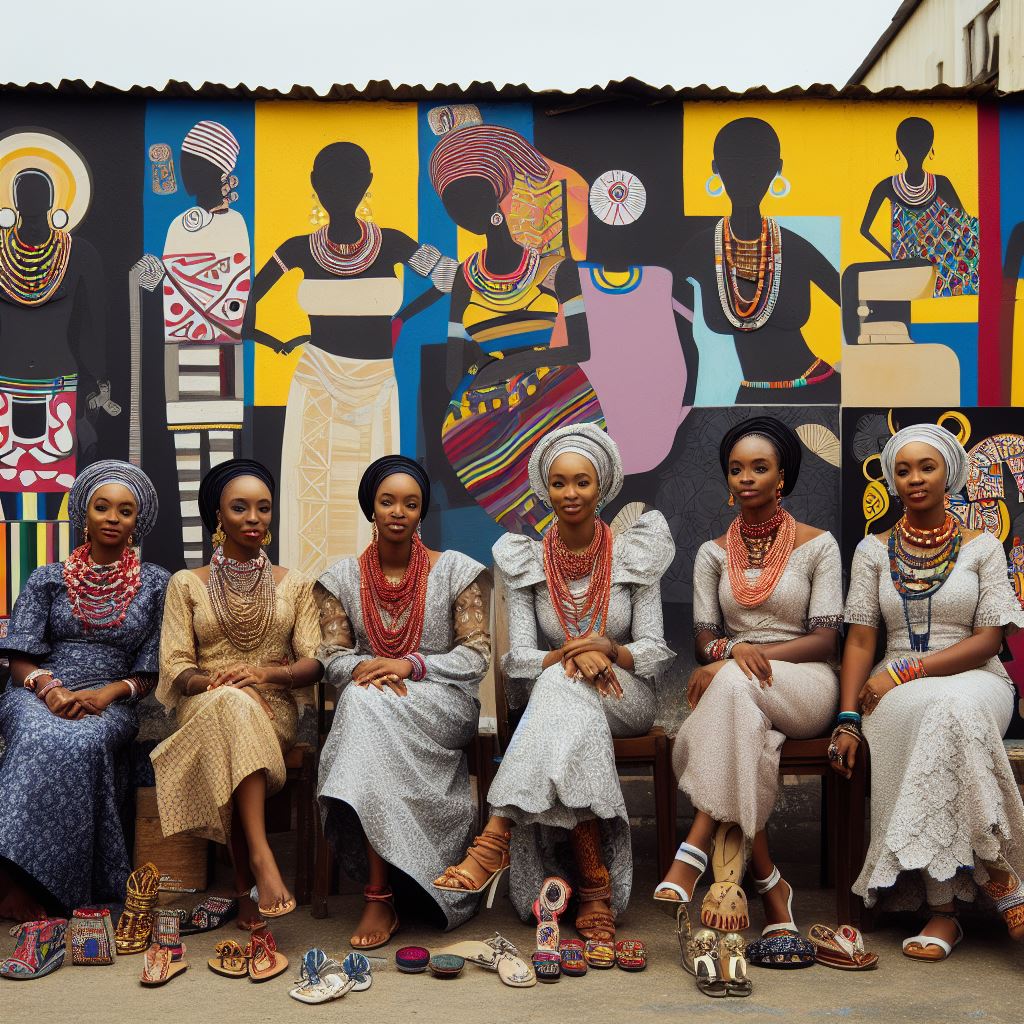Introduction
In Nigeria, women entrepreneurs are catalysts of change, driving innovation and economic growth. Despite formidable challenges, their remarkable achievements demand attention.
This section delves into the dynamic landscape of female entrepreneurship in Nigeria, shedding light on the hurdles they face and the milestones they conquer.
It’s imperative to explore and understand the unique struggles and triumphs of these women, as their stories contribute significantly to the nation’s socioeconomic fabric.
As we navigate through their entrepreneurial journeys, we uncover not only the barriers hindering progress but also the resilience that propels them forward.
This exploration is crucial for fostering an inclusive and supportive environment that empowers women entrepreneurs to thrive in Nigeria’s business ecosystem.
Historical Background of Women Entrepreneurs in Nigeria
Women entrepreneurs in Nigeria have a long history of breaking barriers and making significant contributions to the country’s economy.
Brief overview of the historical context of women entrepreneurs in Nigeria
- Before colonization, Nigerian women played active roles in trade and commerce.
- However, during the colonial period, their economic activities were restricted to small-scale businesses.
- After independence in 1960, there was a growing recognition of the importance of women entrepreneurs.
- The Nigerian government implemented various policies to promote women’s participation in business.
- Today, women entrepreneurs in Nigeria play a vital role in the country’s economic development.
Notable women from the past who paved the way for current entrepreneurs
- Alhaja Humuani Alaga, a successful textile trader in the 19th century, inspired many women to venture into business.
- Chief (Mrs.) Funmilayo Ransome-Kuti, a prominent activist, fought for women’s rights and economic empowerment.
- Hajiya Gambo Sawaba, a political leader and entrepreneur, advocated for women’s participation in decision-making processes.
- Dr. Stella Ameyo Adadevoh, a renowned medical doctor, founded a private healthcare center, demonstrating women’s entrepreneurial abilities.
- Folorunsho Alakija, the richest woman in Nigeria, built a successful business empire in the oil and fashion industries.
In Nigeria, these trailblazing women shattered societal norms, paving the way for today’s thriving female entrepreneurs. Their resilience and success inspire countless others.
Acknowledging the historical context, we grasp the progress made and the ongoing challenges. Women face obstacles: limited capital, cultural barriers, gender stereotypes.
Yet, a new generation is breaking these barriers, leveraging tech, networking, and education for business growth. Associations like Nigerian Women Business Network and Women’s Business Group offer vital support and mentorship.
Initiatives like Women’s Entrepreneurship Day and She Trades Nigeria champion gender equality. The government, especially the Central Bank, implements gender-friendly policies, enhancing funding access.
In short, Nigerian women entrepreneurs, rooted in history, contribute significantly to the economy. Despite challenges, support is steadily transforming the entrepreneurial landscape for women.
Challenges Faced by Women Entrepreneurs in Nigeria
Starting a business as a woman in Nigeria entails overcoming hurdles like societal norms and gender biases. These obstacles impede progress despite determination and ambition.
Societal norms discourage women’s participation, perpetuating the belief that they should stay in the domestic sphere. Cultural restrictions hinder those aiming to venture into entrepreneurship.
Gender bias skews the playing field against women entrepreneurs. Prejudices prevail when seeking financial support or partnerships, hindering their credibility compared to male counterparts.
Limited access to resources poses a challenge. Obtaining loans, capital, and investments is difficult, constraining the ability to start or expand businesses and limiting growth potential.
Networking opportunities are scarce. Access to platforms that foster connections and partnerships is restricted, impeding learning and mentoring relationships critical for success.
Education gaps hinder women. Tailored training programs are lacking, leaving them at a disadvantage when starting or managing businesses.
Balancing work and family is a struggle. Societal expectations burden women, complicating success in entrepreneurship.
Inadequate government support compounds challenges. Insufficient policies exacerbate the unique needs of women entrepreneurs, hindering economic contribution.
Overcoming these challenges is crucial. Empowering women entrepreneurs leads to economic growth, job creation, and poverty reduction.
Addressing these hurdles requires concerted efforts. Challenging gender norms, implementing gender-equal policies, and providing financial support and educational programs are essential.
Government initiatives are pivotal. Policies promoting gender equality, financial support, and tailored educational programs are imperative.
Organizational support is necessary. Mentorship programs, networking opportunities, and access to capital empower women entrepreneurs.
Creating an enabling environment is key. Unlocking the potential of ambitious women contributes positively to Nigeria’s economy.
In fact, recognizing and addressing challenges faced by women entrepreneurs in Nigeria is vital for gender equality, economic growth, and harnessing their immense potential.
Success Stories of Women Entrepreneurs in Nigeria
In Nigeria, women entrepreneurs like Ifunke Opeke, founder of Main One, shattered gender bias.
She pioneered West Africa’s first privately-owned submarine cable company, revolutionizing global broadband connectivity. Her innovative model not only enhanced Nigeria’s internet but spurred economic growth.
Ibukun Awosika, founder of The Chair Centre Group, triumphed over societal limitations, building a furniture empire from scratch. Her company furnishes top organizations, inspiring aspiring entrepreneurs.
Tara Fela-Durotoye, CEO of House of Tara, transformed a small makeup studio into a multinational enterprise, empowering women through training and business opportunities.
Adenike Ogunlesi, founder of Ruff ‘n’ Tumble, started small, grew big, creating jobs, and contributing to the Nigerian textile industry.
Linda Ikeji, founder of a popular blog, exemplifies dedication and consistency, impacting the entertainment industry.
These women’s success stories defy norms, showcasing resilience and tenacity, inspiring a culture that supports and uplifts women entrepreneurs for a more inclusive, prosperous society.
Government Policies and Support for Women Entrepreneurs
Analyze the existing government policies aimed at promoting women entrepreneurship in Nigeria
In this section, we will analyze the existing government policies aimed at promoting women entrepreneurship in Nigeria and discuss the effectiveness of these policies and programs in empowering women entrepreneurs.
- Gender Equality Policy: The Nigerian government has adopted a gender equality policy that recognizes the importance of providing equal opportunities for women in business.
- Financial Support Programs: Various government agencies provide financial support programs specifically designed for women entrepreneurs, such as low-interest loans and grants.
- Business Development Training: The government has established training programs to equip women entrepreneurs with essential skills and knowledge needed to succeed in business.
- Access to Markets: Efforts have been made to create platforms and initiatives that help women entrepreneurs access local and international markets, increasing their business opportunities.
- Mentorship Programs: The government has launched mentorship programs where successful women entrepreneurs provide guidance and support to aspiring women business owners.
- Legal Protection: The government has implemented laws and regulations to protect women entrepreneurs from discrimination and provide a conducive business environment.
- Networking and Collaboration: The government encourages networking and collaboration among women entrepreneurs through various platforms and events.
- Government Procurement Policies: The government has introduced policies that require a percentage of public procurement contracts to be awarded to women-owned businesses.
The effectiveness of these policies and programs in empowering women entrepreneurs
However, despite the existence of these government policies and programs, their effectiveness in empowering women entrepreneurs in Nigeria is a subject of debate.
On one hand, some argue that there has been progress in promoting women entrepreneurship, with more women entering various business sectors and achieving success.
On the other hand, others believe that these policies and programs have not fully addressed the barriers faced by women entrepreneurs, and there is still a long way to go.
One of the main challenges is the lack of proper implementation and enforcement of these policies.
Additionally, many women entrepreneurs still struggle to access the promised financial support and face bureaucratic hurdles.
Moreover, cultural and societal norms continue to limit women’s participation in business, reducing their access to resources and opportunities.
Another concern is the sustainability of government programs. Some programs are short-term and lack long-term support, hindering the growth and development of women-owned businesses.
To address these issues, efforts should be made to enhance the effectiveness of government policies through comprehensive monitoring and evaluation mechanisms.
Furthermore, to improve awareness about the available support programs and encourage more women to take advantage of them, collaboration with the private sector and non-governmental organizations is essential.
In general, while the Nigerian government has taken significant steps to promote women entrepreneurship, there are still areas that require attention to ensure the effectiveness of these policies and programs.
Continuous evaluation, awareness, and collaboration are key factors in empowering women entrepreneurs and breaking the barriers they face.
Read: Business Grants and Loans in Nigeria for Entrepreneurs

Supportive Initiatives and Organizations
In Nigeria, various non-governmental organizations (NGOs) and initiatives play a vital role in supporting women entrepreneurs and breaking barriers they face.
These organizations recognize the potential of women-led businesses and aim to provide them with the necessary resources and networks to thrive.
Women’s Initiative for Self-Empowerment (WISE)
- WISE is a prominent NGO in Nigeria that focuses on empowering women entrepreneurs.
- It offers training programs, mentoring, and access to capital for women-led businesses.
- WISE also provides networking opportunities, allowing women entrepreneurs to connect and share experiences.
- Through their initiatives, WISE aims to address the specific challenges faced by women in business.
Fate Foundation
- Fate Foundation is a leading organization that supports aspiring and established women entrepreneurs.
- They provide entrepreneurship training, mentoring, and access to a vast network of professionals.
- Fate Foundation organizes business clinics and workshops to enhance the skills of women entrepreneurs.
- Through their valuable resources, women-led businesses can scale up and achieve sustainable growth.
She Leads Africa
- She Leads Africa is a platform that supports African women in entrepreneurship.
- They offer online and offline programs, empowering women with the necessary skills and knowledge.
- Through their network, women entrepreneurs can connect with investors, mentors, and potential clients.
- She Leads Africa hosts pitch competitions and provides access to funding opportunities for women-led startups.
The Women’s Board
- The Women’s Board is an initiative that focuses on enhancing women’s leadership in business.
- They provide mentorship, coaching, and capacity-building programs for women entrepreneurs.
- The Women’s Board also advocates for policies that promote gender equality and inclusivity in the business sector.
- Through their efforts, they aim to break down barriers and create a conducive environment for women-led businesses.
Nigerian Association of Women Entrepreneurs (NAWE)
- NAWE is an association that supports and represents women entrepreneurs in Nigeria.
- They provide platforms for networking, learning, and advocacy for women-led businesses.
- NAWE organizes conferences, workshops, and exhibitions to promote the growth of women entrepreneurs.
- Through their initiatives, they enable women to access business opportunities and expand their networks.
These organizations and initiatives have proven instrumental in enabling women entrepreneurs to overcome the barriers they face.
Through their provision of training, mentoring, networking opportunities, and access to funding, these entities empower women-led businesses to thrive and succeed in Nigeria’s competitive business landscape.
Through their collective efforts, these organizations contribute to the overall economic growth of Nigeria by harnessing the immense potential of women entrepreneurs.
However, further support and collaboration from both the government and private sector are crucial to ensure the sustainability and scalability of these initiatives.
As Nigeria continues to recognize the value of women entrepreneurs and their immense contributions to the economy, it is imperative to invest in supportive initiatives and organizations.
By doing so, the barriers hindering women’s progress in business can be gradually dismantled, leading to a more inclusive and prosperous entrepreneurial ecosystem.
Read: The Tech Startup Scene in Nigeria: An Entrepreneur’s Guide
Emerging Trends and Opportunities for Women Entrepreneurs
In today’s evolving business landscape, women entrepreneurs in Nigeria are breaking barriers and making significant strides.
This section will explore the current trends in women entrepreneurship and highlight potential opportunities and markets for women to explore.
Rise of Technology-driven Businesses
- Technology-driven businesses are on the rise in Nigeria, with women leading the way.
- Women entrepreneurs are leveraging technology to launch innovative startups and digital platforms.
- These businesses span various sectors, such as e-commerce, fintech, healthtech, and edtech.
- With the increasing digitalization of Nigeria’s economy, technology-driven ventures offer immense growth potential for women entrepreneurs.
Growth of Social Enterprises
- Social enterprises, focused on addressing social or environmental challenges, are gaining momentum.
- Women entrepreneurs are at the forefront, providing sustainable solutions to societal issues.
- These enterprises combine business goals with a social mission, creating a positive impact on communities.
- Investors and consumers are increasingly supporting social enterprises, fostering a favorable ecosystem for women entrepreneurs.
The Power of Networking and Collaboration
- Networking and collaboration have become integral to the success of women entrepreneurs.
- Organizations and initiatives, such as women-focused business networks and mentorship programs, are empowering women.
- Collaborative spaces, incubators, and accelerators provide support and connect women with resources and opportunities.
- Through networking and collaborations, women entrepreneurs can access funding, partnerships, and valuable knowledge sharing.
Access to Funding and Financial Inclusion
- Access to funding remains a challenge for women entrepreneurs in Nigeria.
- However, there is a growing recognition of the importance of financial inclusion for women-led businesses.
- Government initiatives, angel investors, venture capital firms, and impact investors are becoming more supportive of women entrepreneurs.
- Financial institutions are also developing tailored products and services to meet the funding needs of women-owned businesses.
Emerging Opportunities in Agribusiness
- Agribusiness presents vast opportunities for women entrepreneurs in Nigeria.
- With a rising population and increasing demand for food products, women can tap into the agricultural sector.
- Opportunities include processing, packaging, distribution, and export of agricultural products.
- Women-led agribusinesses can also explore organic farming, food processing innovations, and sustainable practices.
Retail and e-Commerce Growth
- The retail sector, particularly e-commerce, is experiencing significant growth in Nigeria.
- Women entrepreneurs can leverage this trend by establishing online stores and digital marketplaces.
- E-commerce platforms provide a low-cost entry point for women to start and scale their businesses.
- By tapping into the e-commerce boom, women entrepreneurs can reach a broader customer base and expand their market reach.
Health and Wellness Entrepreneurship
- Health and wellness entrepreneurship is emerging as a promising sector for women in Nigeria.
- Women are launching businesses in fitness, wellness coaching, healthcare products, and services.
- The growing emphasis on personal well-being and preventive healthcare creates opportunities for women entrepreneurs.
- By providing innovative solutions in the health and wellness space, women can tap into a growing market.
In essence, women entrepreneurs in Nigeria are embracing emerging trends and seizing opportunities across various sectors.
By harnessing technology, exploring social enterprises, networking, accessing funding, and tapping into emerging industries, women are breaking barriers and creating successful businesses.
With continued support and a conducive ecosystem, the future looks promising for women entrepreneurship in Nigeria.’
Read: Entrepreneur Networking Events in Lagos and Abuja
Measures to Further Empower Women Entrepreneurs
Possible Measures to Break Down Barriers and Empower Women Entrepreneurs in Nigeria
- Implement gender-sensitive policies and legislation that promote equal opportunities for women entrepreneurs.
- Offer customized training and capacity-building programs to enhance the business skills of women entrepreneurs.
- Create networking platforms and support groups specifically designed for women entrepreneurs to share experiences and resources.
- Provide mentorship programs that connect women entrepreneurs with successful business leaders and role models.
- Establish programs to increase women’s access to finance, including microloans and venture capital.
- Promote entrepreneurship education in schools and universities to inspire and encourage young girls to pursue entrepreneurial careers.
- Enhance access to market information and opportunities for women entrepreneurs through technology and innovation.
- Collaborate with international organizations and development partners to ensure the sustainability of empowering programs.
- Encourage women’s participation in decision-making processes at all levels of government and business organizations.
- Integrate gender perspectives in entrepreneurship research, policy formulation, and program evaluation.
The Importance of Mentorship, Access to Finance, and Fostering a Supportive Ecosystem for Women’s Entrepreneurship
Mentorship is a pivotal factor in empowering women entrepreneurs in Nigeria.
By having a mentor, women receive guidance, support, and invaluable insights derived from personal experiences.
This mentorship enables them to effectively navigate challenges, make informed decisions, and establish networks that significantly contribute to the success of their businesses.
Access to finance is another essential factor in empowering women entrepreneurs.
Gender biases and limited collateral often hinder women from accessing capital.
Bridging this gap requires innovative financial solutions, such as microloans and venture capital specifically tailored for women-led businesses. Improved access to finance enables women to invest in their enterprises, expand operations, and achieve sustainable growth.
Fostering a supportive ecosystem for women’s entrepreneurship is equally important. This involves creating an enabling environment through policy reforms that provide equal opportunities and protections.
It also includes establishing networking platforms and support groups where women can exchange knowledge, share resources, and collaborate on business ventures.
A supportive ecosystem empowers women entrepreneurs by fostering a sense of belonging, facilitating learning, and amplifying their voices.
Generally, breaking down barriers and empowering more women entrepreneurs in Nigeria requires a multi-dimensional approach. Implementing gender-sensitive policies, offering tailored training programs, and promoting mentorship are essential steps.
Additionally, addressing the challenge of access to finance and fostering a supportive entrepreneurial ecosystem are crucial for women’s empowerment.
By embracing these measures, Nigeria can unlock the immense potential of women entrepreneurs, driving economic growth and social progress.
Read: Nigeria’s Top Entrepreneurs: Success Stories and Lessons
Conclusion
The blog post highlighted the immense potential of women entrepreneurs in Nigeria, showcasing their tremendous resilience and determination in breaking barriers and achieving success across various industries.
While acknowledging the challenges faced by women entrepreneurs, such as limited access to funding, cultural biases, and a lack of business networks, the post also emphasized their ability to overcome these obstacles through innovation, creativity, and perseverance.
It stressed the importance of continuing to support and recognize women entrepreneurs in Nigeria.
By providing them with equal opportunities, access to capital, and mentorship programs, their growth can be fostered, contributing significantly to the economic development of the country.
The post underscored that women entrepreneurs in Nigeria have demonstrated skills, expertise, and vision capable of driving change and creating thriving businesses, and their contributions should not be overlooked or underestimated.
In the end, the empowerment and encouragement of women entrepreneurs can tap into an incredible source of potential, driving sustainable economic growth for the future of Nigeria.
The post called for celebrating their achievements, creating an environment that nurtures and supports their entrepreneurial endeavors.
By breaking barriers and debunking stereotypes, women entrepreneurs in Nigeria have the power to transform not only their own lives but also the entire nation.
The call to action was to continue uplifting their voices, providing equal opportunities, and recognizing the invaluable contributions they make to society.




